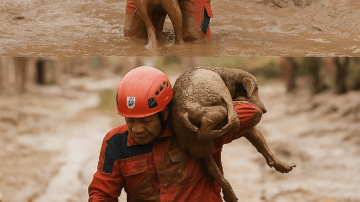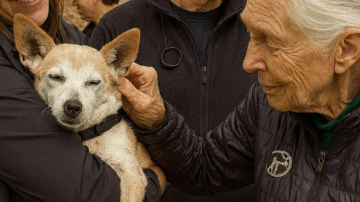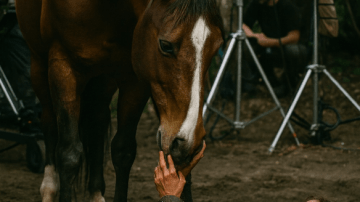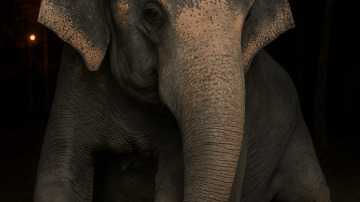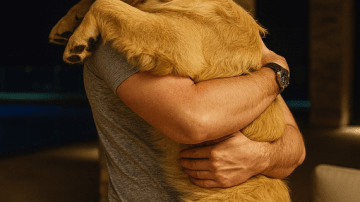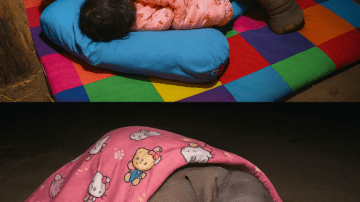It began beside a trash bin on an ordinary street. A worker passing by heard the sound first—a piercing, desperate cry that did not belong in the air. Following it, he found a small puppy lying on the ground, trembling, whimpering in pain. Someone had left him there, alone, discarded as though he were nothing.

The worker explained later that a man had carried the puppy to that spot and walked away. He had even tossed the little dog a piece of bread, but the puppy could not eat. He did not react at all. His body was rigid with pain, his cries growing weaker with every passing moment.
We rushed him to the nearest veterinarian. At the same time, we contacted the authorities, determined to uncover who this man was. When the vet examined the puppy, his words cut like knives. “I cannot help. He will not survive.” The diagnosis was grim, the hope nearly extinguished.
But we were not ready to give up. We decided to move him immediately to a larger veterinary hospital, racing against time. An hour later, we arrived. By then, his condition was critical. The team of doctors gave him emergency care, stabilizing his fragile body. Only then did they explain the full extent of his injuries. The puppy’s skull was fractured.
The doctor offered us two choices. The first was the merciful release of euthanasia—to let him slip away quietly, sparing him further pain. The second was to believe in miracles. We chose the second.

For days, his condition wavered. He hovered between life and death. Yet slowly, one tiny improvement appeared: the cerebrospinal fluid leakage stopped. This fragile sign meant he had crossed the thinnest line between survival and loss. He had escaped immediate death.
The cause of his injuries became clear. A blunt object had struck him, damaging his cerebellum. The blow left him unable to walk properly. He staggered, moving in helpless circles, unable to control his steps. The pain in his head was unbearable, but still, he lived.
We transferred him to a rehabilitation center. The doctors warned us: “A full recovery is impossible. He will never be one hundred percent. But perhaps, with therapy, he can live a normal, happy life.” That was enough.
He received support from neurologists and trainers. Every day was filled with effort. We named him Yuko. Despite the odds, this tiny, fragile puppy radiated positive energy. His determination was breathtaking. He fought with every ounce of strength, surprising even the doctors. One of them shook his head and said, “I did not think he would survive. But look at him.”

Meanwhile, the authorities traced the man responsible. They identified his car, his license plate, and confronted him. He confessed. He said the puppy had chewed his brand-new shoes, and in a fit of anger, he struck him and abandoned him by the trash. He insisted he had not meant to cause so much harm. But his regret was too little, too late. The law would hold him accountable.
While justice unfolded, Yuko continued to fight. He gained weight, his body growing stronger. He learned commands, showing intelligence and trust. Walking became easier. What had once been thought impossible now became real. His recovery reached ninety-two percent—far more than the seventy-five percent doctors had dared to hope for.
Six months passed like a dream. Those months were filled with sweat, tears, and sleepless nights, but also with triumph. Yuko’s efforts, combined with love and care, created a miracle no one could explain. How had this little dog, once left broken by a trash bin, defied every expectation? Was it medicine? Was it resilience? Or was it simply the power of love?
Whatever the reason, Yuko had become a miracle himself.
The day came when he was finally ready to leave rehabilitation. He walked beside us with steadier steps, his tail wagging with joy. He looked around at the world with eyes full of life, no longer a victim, but a survivor.
Yuko is now beginning a new chapter. His scars remain, but they no longer define him. What defines him now is his spirit, his courage, and the love that surrounded him when he needed it most. He has found a family who will never abandon him again. He has turned his pain into a story of triumph.

Yuko’s journey reminds us of something vital: miracles are not born from chance alone. They are born from compassion, from persistence, and from the refusal to give up on a life simply because it seems too fragile. He was left to die, but with love, he learned to live again.
For Yuko, the nightmare is over. The world is new, full of light, full of hope. And for those of us who stood by him, he will always be proof that even the smallest, most broken creature can shine when given a chance.

